On May 9th, the National English Innovation and Development Seminar of Higher Education, along with the publishing conference, were held in GDUFS. ZHONG Weihe, GDUFS President, as well as the Chief Editor of the new CECL; and SUN Youzhong, Vice President of the Beijing Foreign Studies University; Stephen E. Lucas from the University of Wisconsin; HUANG Guowen from Sun Yat-sen University; XU Jianzhong from the Foreign Language Teaching and Research Press, and other experts and scholars from more than 20 different provinces gathered together, probing into the innovation and development of English curricula and congratulating all on the publication of the new CECL.
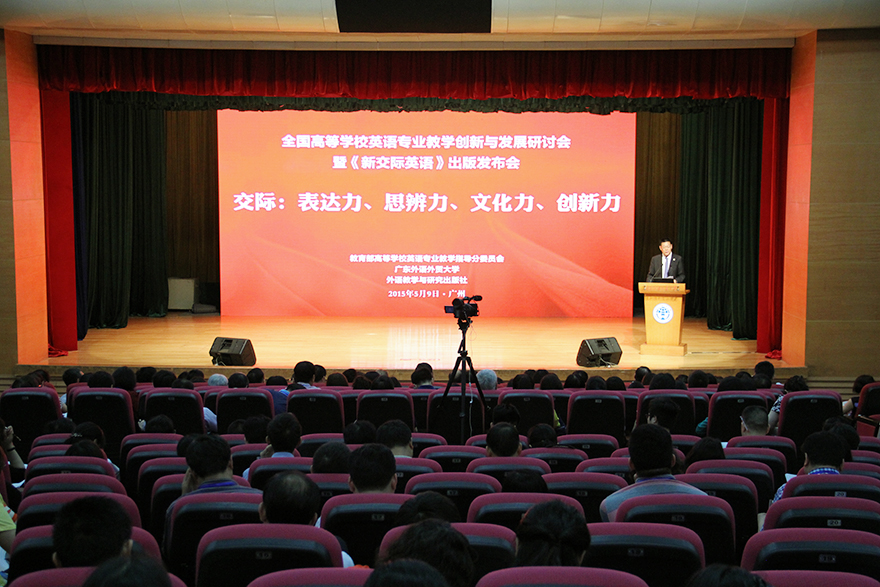
Scene of the seminar and publishing conference
In order to adapt to the new trend and requirements of English major’s reform and development, the Foreign Language Teaching and Research Press together with top universities headed by GDUFS, are undergoing a comprehensive revision of the CECL and the new volume is being published officially now. The new revised CECL includes a comprehensive course, a reading course, a writing course, a listening course and a speaking course. The new coursebook conveys the idea of “Mass Education,” seeing communicative ability as the core concept. It is aimed at cultivating the expression, analysis, and cultural understanding of students, pushing them to possess and optimize their expertise and career potential, and also encourage those who can accommodate to national economic development and social development—called the international and innovative foreign language elite.
In terms of content the new CECL was edited according to the mission series. Each series includes 4 categories: a complementary mission, a start-up mission, a target mission, a language mission and a consolidation as well as a continuation. Missions are connected closely to each other and arranged from the advanced gradation to the simplest one. Not only can it boost the learning interests of students, but also it is helpful in improving their practical linguistic abilities. In terms of subject-selection, the course combined the knowledge structure with logistic characteristics of contemporary university students. Whether or not the course can trigger the student’s communicative will was seen as the chief standard for choosing the course material. The contents are not only concerning our daily life, but also education, society, technology, international relations, mythology, religion and so on.
In terms of the design, the format of the course book is fashionable and proper, which can dramatically spark the study interests and motivations of students. In addition, in order to meet the personalized and independent learning requirements of students, the new CECL relies on the “unipus project” of the Foreign Language Teaching and Research Press, equipping the project with a digital course book. Students can achieve their online or normal independent learning and consolidate the knowledge through mobile phones, laptops and computers. Moreover, the course book also offers a guidebook for teachers, using explicit thought, thinking and teaching methods to support the development of teachers’ in-class abilities. New CECL inherits brilliant traditions while leading development of new trends.
New CECL was compiled under “national standard’s” instruction
In the opening ceremony, ZHONG Weihe emphasized that the new CECL is based on the national standard of teaching quality in English majors, one which will be simplified as the National Standard evolve. The National Standards required the educational target of English Majors is assuring that students possess the basic abilities in the English language, which includes the ability of English usage, the ability of appreciating English literature, the ability of cross-cultural communication, the ability of acquiring and updating professional knowledge and the ability of analyzing and innovating in various subject areas. In order to achieve these targets, the English professional courses should involve both basic and professional curriculums. New CECL not only relies on the content, but also is led by the principals of task-based language teaching. Students are able to contact with English language, the social cultures of English speaking countries, the linguistic structures, the English literature and the importance of language as relates to different nationalities. Students will participate in various kinds of active tasks. The fundamental exercise will no longer be fragmented. The training of language will be merged with the acquisition of knowledge, which helps students to acquire the abilities of listening, speaking, reading and writing. The skills they get will be exceedingly beneficial throughout their lives.
Principal ZHONG further introduced the history and development of CECL in our university. In the 1980s, we pioneered in applying the teaching method that valued the communicative skills and practice most of all. This was applied to English majors at the basic stage, led by Professor LI Xiaoju from the Faculty of English Language and Culture. The core curriculum CECL (Communicative English for Chinese Learners) came out as a fruit of nearly one decade's teaching experience and research. CECL was awarded the excellent textbook prize in the whole of China in 1992 and the curriculum was recognized as the most excellent course in 2003. In 2013, CECL became the excellent course to be shared around the country. As President ZHONG pointed out, without the efforts of the teaching team from one generation to another, CECL would not be such a success.
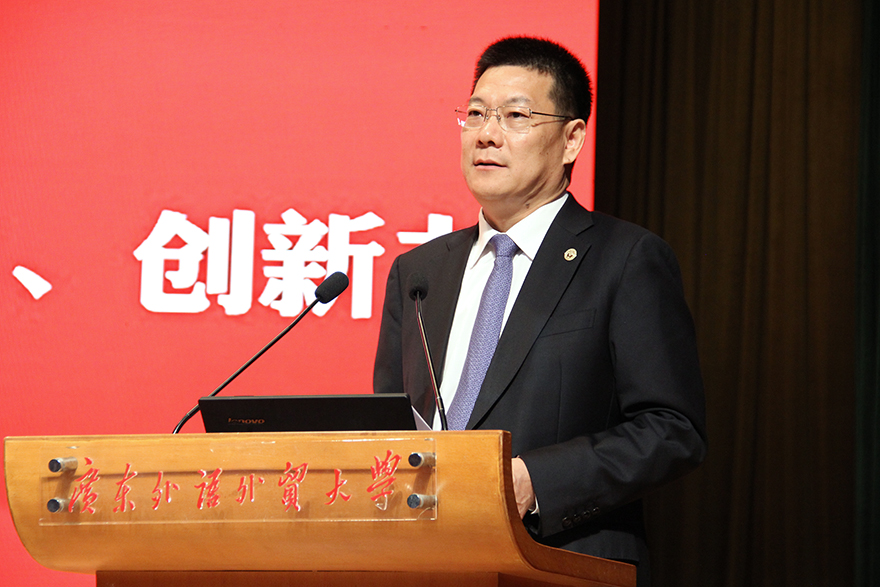
ZHONG Weihe making his presentation
Experts and scholars are probing into the innovation and development of English teaching.
During the seminar, XU Jianzhong brought out the gifts from the Foreign Language Teaching and Research Press—an opening video of the theme of “Ways and Tools of Foreign Languages Teaching.” The video explained that English teaching should “Feel, Enquire and Discover the Methods” when facing challenges. In the meantime, we should endeavor to achieve “Realize, Understand and Answer the ways.”Communicative English for Chinese Learners is a really useful tool for students.
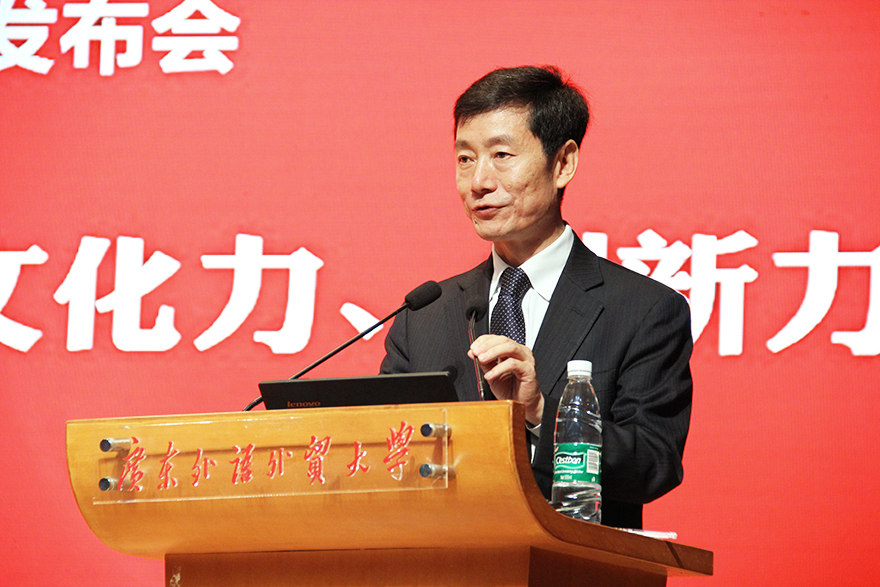
XU Jianzhong, Chief Editor of the Foreign Language Teaching and Research Press presenting his comments
SUN Youzhong gave a speech congratulating all on the publishing of the new CECL noting that: ‘We should combine humanity quality with professionalism when cultivating the English major elites. We should enrich their expertise and cross-cultural communicative abilities, as well as foster their aspirations and qualities.’ Stephen E Lucas gave a talk entitled ‘concerning speaking abilities and English major elites’. He took 2 Chinese universities’ speaking competitions as examples, explaining public English speech is beneficial for students to gain confidence as well as improve their listening, speaking, writing and other skills.
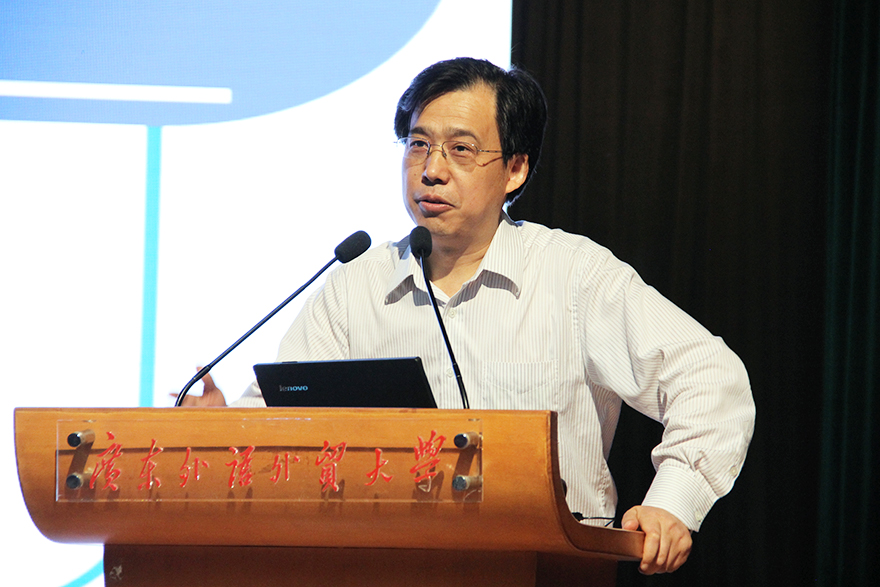
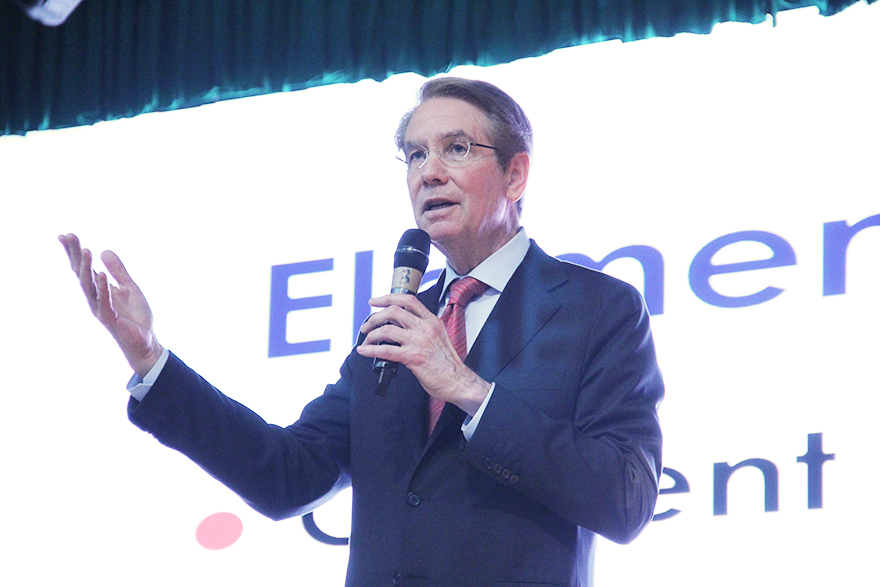
SUN Youzhong and Stephen Lucas respectively giving their talks
LIU Jianda, the Vice President of GDUFS, hosted the afternoon’s conference. Chief editors of the new CECL, with the professor WU Xudong from the Faculty of English Language and Culture, who is also the doctoral supervisor, gave their project report named “Transform the Pattern, Innovate the Methods; Cultivating Practical English Abilities.” Chief editors and editors of the new CECL, FENG Wei and WU Zhiwei from Faculty of English Language and Culture, exchanged their ideas with experts and scholars in terms of teaching philosophy.

